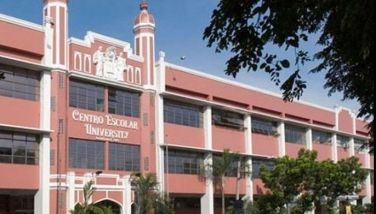Watch the regulators more than the Cabinet

August 23, 2004 | 12:00am
Critics of the new Cabinet appointees are either loud speakers of the coveters who didn’t get the portfolios, or they’re just plain loud mouths.
Noli de Castro bashers, for one, rile against his holding three posts as Vice President, Anti-Poverty Commission co-chairman, and presidential assistant on overseas Filipinos. He won’t be able to hack it, they say. How do they know, when he has yet to start working? They forget that de Castro used to be the most popular media personality around. At ABS-CBN at one point, he served concurrently as vice president, television show host and newscaster, and radio anchor.
Avelino Cruz bagged the defense portfolio only because he was Mrs. Arroyo’s personal lawyer, detractors sniff. They overlook the fact that he served as presidential chief legal counsel in 2001-2003. Before that he co-founded the Carpio Villaraza Cruz law firm; his is is the last name in that partnership only because of seniority. During his senior year as Math major at Ateneo University, he was editor-in-chief of the campus organ, Guidon. Cruz was student council president at UP-Law, then graduated cum laude. He was among the ten top-notchers of the 1978 bar exam. Oh, but he has no military experience other than college ROTC, critics rant on. Well, Ramon Magsaysay, Juan Ponce Enrile and Orlando Mercado were as inexperienced when they became among the few civilian defense secretaries. A defense chief, whether a retired general or a civilian, is not part of the military chain of command anyway, but a recommender-implementer of defense policy. Besides, defense is only partly a military concern, but mostly a political call. Cruz was president of the UP-Law Alumni Association, director of the Integrated Bar of the Philippines, and president of the Philippine Bar Association.
Jeerers grunt that some Arroyo choices are mere accommodations from her political coalition. What do they want her to do pick from the vicious Opposition?
A sharp-eyed President will spot talent from groups working closest to her. She naturally taps for help the top achievers and, more importantly, sharers of her vision. Some allies would recommend perfect strangers, but no chief executive will gamble with the top-most positions, only with "harmless" ones.
The new Cabinet men are bound to commit mistakes, like all humans do. The decent thing to do for critics is to wait if such mistakes would cost the country huge losses, or if the appointees can correct themselves quickly enough to accomplish more. The thing to watch is if the Cabinet men would be true workers and not thieves, if they would be reformists and not protectors of vested interests.
The critics, like all Filipinos, are stakeholders in Philippines Inc. But they are not necessarily managers. Good managers allow for mistakes by subordinates. Those who don’t or can’t are no managers, just kibitzers.
Keen observers do not bother much jwith Cabinet appointees, mostly boring presidential clones anyway. For them, the crucial postings to watch are those in regulatory commissions-agencies that can make or break the economy or industry sectors. Such bodies-like the Civil Aeronautics Board, or Fertilizer and Pesticide Authority, or Tariff Commission-are usually attached to line departments, But their quasi-judicial regulatory functions free them from Cabinet supervision. Their chiefs can go above the secretaries’ heads and report directly to the President. Or they can quietly, slyly promote vested interests-a favored company over its competitors, or the regulated industry over the public welfare.
If ship rates are higher from Bukidnon to Manila than from Bangkok, it can be partly due to area shipping monopolies granted by the Maritime Industry Authority-to the detriment of farmers and traders. If the coconut levy issue was getting nowhere for some time, it could have been because the Coconut Industry Authority sat on it. If sugar barons receive subsidies to buy limousines instead of new cane varieties, it can be with the collusion of the Sugar Regulatory Administration.
There are nearly three dozen regulatory bodies, and each needs close watching. Among them: Philippine Ports Authority, Land Transportation Franchising and Regulatory Board, Philippine Overseas Employment Authority, National Housing Authority, Commission on Higher Education, National Commission on Culture and the Arts, Bureau of Internal Revenue, Bureau of Customs, Environmental Management Bureau, Board of Investments, Bureau of Food and Drugs, Land Registration Authority, Bureau of Immigration and Deportation, Instructional Materials Board, Export Processing Zone Authority, Commission on Overseas Filipinos, Housing and Land Use Regulatory Board, National Police Commission, Bases Conversion and Development Authority, Toll Regulatory Board, Games and Amusement Board, Philippine Racing Commission, Philippine Sports Commission, Philippine Tourism Authority, Cooperatives Development Authority, Securities and Exchange Commission, National Food Authority, Professional Regulatory Commission, Public Estates Authority, Movie and Television Rating and Classification Board, Videogram Rating Board, National Telecommunications Commission, Garments and Textile Export Board, National Water Resources Board, Local Waterworks and Utilities Authority, Manila Waterworks and Sewerage System, Metro Manila Authority.
Some, like the Energy Regulatory Commission, already are under close scrutiny by the courts and the public because of abuses of authority or plain incompetence in years past. Others, like the Philippine Leisure and Retirement Authority, are hardly heard of.
Their common names are "administration", "authority", "board", "bureau", "commission". Not a few have been captured by vested interests, and are the worst curtailers of public interest. In such monopoly-controlled agencies, the heads truly deserve the title of "commissioner"-for the obvious financial cuts received from their masters.
Catch Linawin Natin, Mondays at 11 p.m., on IBC-13.
E-mail: jariusbondoc@workmail.com
Noli de Castro bashers, for one, rile against his holding three posts as Vice President, Anti-Poverty Commission co-chairman, and presidential assistant on overseas Filipinos. He won’t be able to hack it, they say. How do they know, when he has yet to start working? They forget that de Castro used to be the most popular media personality around. At ABS-CBN at one point, he served concurrently as vice president, television show host and newscaster, and radio anchor.
Avelino Cruz bagged the defense portfolio only because he was Mrs. Arroyo’s personal lawyer, detractors sniff. They overlook the fact that he served as presidential chief legal counsel in 2001-2003. Before that he co-founded the Carpio Villaraza Cruz law firm; his is is the last name in that partnership only because of seniority. During his senior year as Math major at Ateneo University, he was editor-in-chief of the campus organ, Guidon. Cruz was student council president at UP-Law, then graduated cum laude. He was among the ten top-notchers of the 1978 bar exam. Oh, but he has no military experience other than college ROTC, critics rant on. Well, Ramon Magsaysay, Juan Ponce Enrile and Orlando Mercado were as inexperienced when they became among the few civilian defense secretaries. A defense chief, whether a retired general or a civilian, is not part of the military chain of command anyway, but a recommender-implementer of defense policy. Besides, defense is only partly a military concern, but mostly a political call. Cruz was president of the UP-Law Alumni Association, director of the Integrated Bar of the Philippines, and president of the Philippine Bar Association.
Jeerers grunt that some Arroyo choices are mere accommodations from her political coalition. What do they want her to do pick from the vicious Opposition?
A sharp-eyed President will spot talent from groups working closest to her. She naturally taps for help the top achievers and, more importantly, sharers of her vision. Some allies would recommend perfect strangers, but no chief executive will gamble with the top-most positions, only with "harmless" ones.
The new Cabinet men are bound to commit mistakes, like all humans do. The decent thing to do for critics is to wait if such mistakes would cost the country huge losses, or if the appointees can correct themselves quickly enough to accomplish more. The thing to watch is if the Cabinet men would be true workers and not thieves, if they would be reformists and not protectors of vested interests.
The critics, like all Filipinos, are stakeholders in Philippines Inc. But they are not necessarily managers. Good managers allow for mistakes by subordinates. Those who don’t or can’t are no managers, just kibitzers.
If ship rates are higher from Bukidnon to Manila than from Bangkok, it can be partly due to area shipping monopolies granted by the Maritime Industry Authority-to the detriment of farmers and traders. If the coconut levy issue was getting nowhere for some time, it could have been because the Coconut Industry Authority sat on it. If sugar barons receive subsidies to buy limousines instead of new cane varieties, it can be with the collusion of the Sugar Regulatory Administration.
There are nearly three dozen regulatory bodies, and each needs close watching. Among them: Philippine Ports Authority, Land Transportation Franchising and Regulatory Board, Philippine Overseas Employment Authority, National Housing Authority, Commission on Higher Education, National Commission on Culture and the Arts, Bureau of Internal Revenue, Bureau of Customs, Environmental Management Bureau, Board of Investments, Bureau of Food and Drugs, Land Registration Authority, Bureau of Immigration and Deportation, Instructional Materials Board, Export Processing Zone Authority, Commission on Overseas Filipinos, Housing and Land Use Regulatory Board, National Police Commission, Bases Conversion and Development Authority, Toll Regulatory Board, Games and Amusement Board, Philippine Racing Commission, Philippine Sports Commission, Philippine Tourism Authority, Cooperatives Development Authority, Securities and Exchange Commission, National Food Authority, Professional Regulatory Commission, Public Estates Authority, Movie and Television Rating and Classification Board, Videogram Rating Board, National Telecommunications Commission, Garments and Textile Export Board, National Water Resources Board, Local Waterworks and Utilities Authority, Manila Waterworks and Sewerage System, Metro Manila Authority.
Some, like the Energy Regulatory Commission, already are under close scrutiny by the courts and the public because of abuses of authority or plain incompetence in years past. Others, like the Philippine Leisure and Retirement Authority, are hardly heard of.
Their common names are "administration", "authority", "board", "bureau", "commission". Not a few have been captured by vested interests, and are the worst curtailers of public interest. In such monopoly-controlled agencies, the heads truly deserve the title of "commissioner"-for the obvious financial cuts received from their masters.
BrandSpace Articles
<
>
- Latest
- Trending
Trending
Latest
Trending

By VIRTUAL REALITY | By Tony Lopez | 17 hours ago

By FIRST PERSON | By Alex Magno | 17 hours ago
Latest

By POINT OF VIEW | By Francisco Tiu Laurel Jr. | 2 days ago

By VIRTUAL REALITY | By Tony Lopez | 2 days ago
Recommended

























